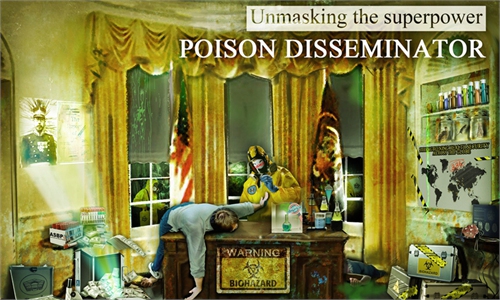IN-DEPTH / IN-DEPTH
Human rights destroyer: US causes humanitarian disasters around globe, killing innocent civilians and creating millions of refugees
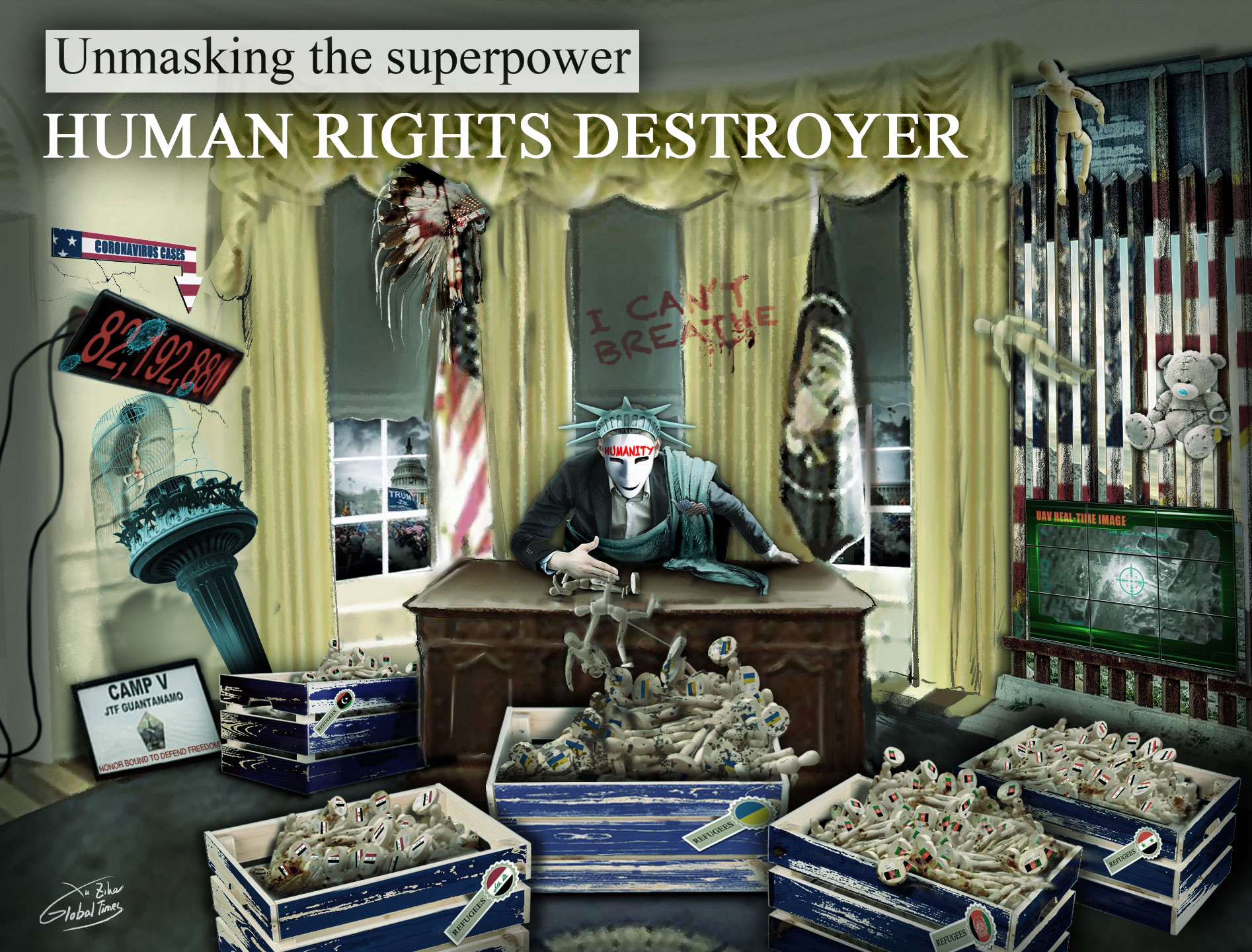
Unmasking the superpower: Human rights destroyer Illustration: Xu Zihe/GT
Editor's Note:
Since the military conflict between Russia and Ukraine began, the international community has grown increasingly aware of the roles the US and NATO have played behind the crisis.
From lip service on the Ukraine refugee issue to a spotty overseas human rights record; from imposing sanctions on "disobedient countries," to coercing other nations to pick sides… the US has acted like a "Cold War schemer," or a "vampire" who creates "enemies" and makes its fortunes from pyres of war. The Global Times is publishing a series of stories and cartoons to demonstrate how the US, in its superpower status, has been creating trouble in the world one crisis after another. This is the sixth installment.
Is the US a "defender" or a "violator" of human rights? Who has been sacrificed on the "altar" of US-touted "democracy?" One Global Times reporter investigated the US' vile practice of igniting war under the pretext of "human rights and democracy."
1 Ukraine crisis instigator: US-led NATO reneges on 'Not one inch eastward' promise to compress Russia's space to the extreme
2 Instability brewer: Behind every war and turmoil in the world is shadow of the Star-Spangled Banner
3 'Vampires' in the war: US warmongers feeding on the bloody turbulence in other countries
4 Cold War schemer: Reminiscing in its past 'victory,' US brings color revolutions to 21st century to maintain its hegemony
5 The poison disseminator: How US spread biological 'poison', ethnic division and ideological antagonism around the world
6 Human rights destroyer: US causes humanitarian disasters around globe, killing innocent civilians and creating millions of refugees
7 'Voldemort' of global order: America is the 'Dark Lord' set on destroying international order
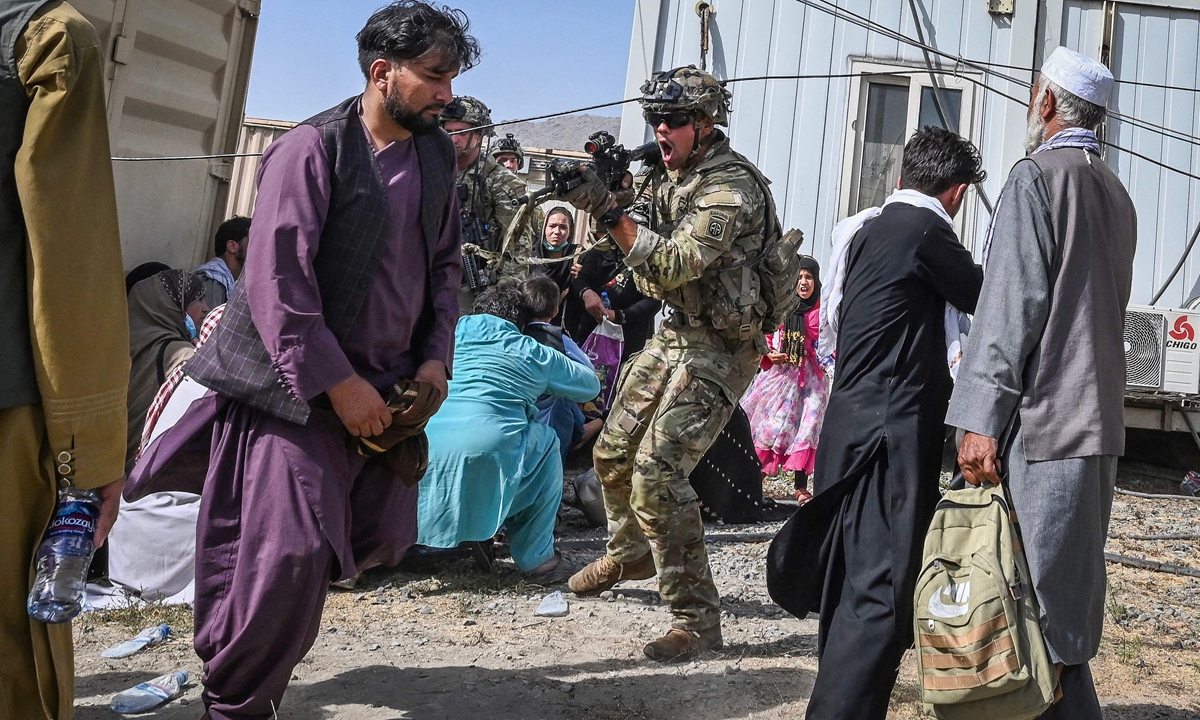
A US soldier points his gun at Afghans in Kabul on August 16, 2021. Photo: VCG
"Why did the United States resettle only 12 Ukrainian refugees in March?" Reuters questioned in a headline on April 12.
More than 4 million people have fled Ukraine to neighboring countries since Russia launched special military operations on February 24, according to United Nations data, setting off Europe's most volatile refugee crisis since the end of World War II, Reuter reported.
Facing growing criticism and pressure from refugee advocates, the Biden administration said on March 24 that the US would use "the full range of legal pathways" to accept up to 100,000 Ukrainians fleeing the war.
This figure stands in stark contrast to the role of the US in stoking the flames in the Russia-Ukraine conflict.
For decades, the US has, in fact, repeatedly waged wars abroad that have resulted in numerous refugees. Yet when it comes to resettling them, the US strategically passes the buck. The plight of the refugees shows that the US, while branding itself as a so-called "defender" of human rights, is actually their greatest "violator," observers said.
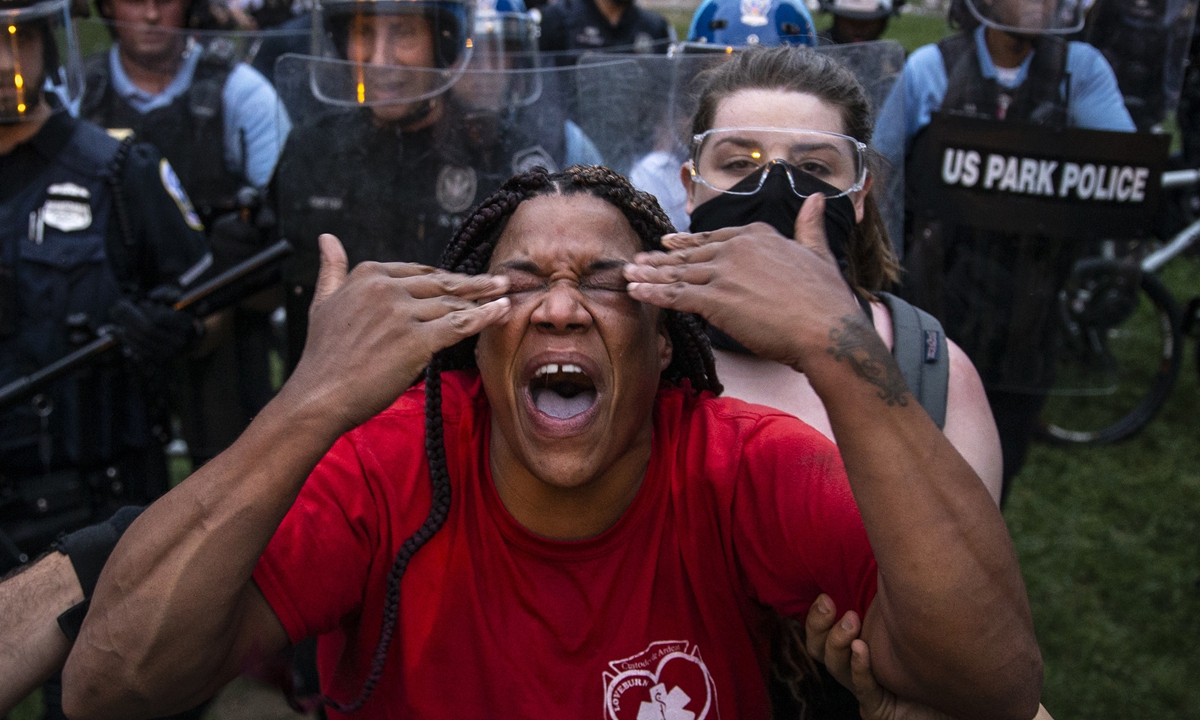
An African-American woman is pepper sprayed by the police during a "Black Lives Matter" demonstration in Washington DC on June 22, 2020. Photo: AFP
US lip-service to Ukraine refugees
"We're going to welcome Ukrainian refugees with open arms if, in fact, they come all the way here," was a promise made by US President Joe Biden and Vice President Kamala Harris, repeated by US Secretary of State Antony Blinken and White House Press Secretary Jen Psaki. Yet the US, the architect of the conflict between Russia and Ukraine, has accepted dismally few refugees.
Reuters reported that the US admitted 514 Ukrainian refugees between January and February, according to State Department data, with only 12 having been resettled in March as the war intensified and the number of Ukrainians fleeing skyrocketed. This means that the number of Ukrainian refugees admitted by the US was only five in late March, when President Biden pledged the US would accept up to 100,000 on March 24.
Perhaps from the start, the US was prepared to leave the resultant refugee crisis to Europe. Jen Psaki had said on March 10 that the administration believes the "vast majority" of refugees will want to remain in neighboring countries where many have family, friends, and former employers.
The US State Department said that it will work with the United Nations to bring Ukrainian refugees to the US if they lack protection in Europe, emphasizing that resettlement to the US would not be a quick process.
The US' lip service can also be reflected in its pathway to accepting refugees. Reuters reported that the pathways include the US refugee resettlement program, which provides a route to citizenship, as well as existing visa avenues and a relief program known as "humanitarian parole," which allows people into the country on a temporary emergency basis.
Under the "humanitarian parole," getting a visa is not an easy thing as applicants must demonstrate their trip is for a bona fide purpose, they will stay for a limited time, they can cover their expenses, and have a place outside the US and other binding ties which will ensure their eventual return home, conditions obviously difficult for many refugees to meet, Forbes reported on April 10.
President Biden has raised the national refugee cap on admissions to an 125,000 for 2022. But six months into the government's fiscal year, the US has accepted fewer than 9,000.
At that pace, it's impossible to imagine the administration's recent promise would be met, one Washington Post opinion piece said.
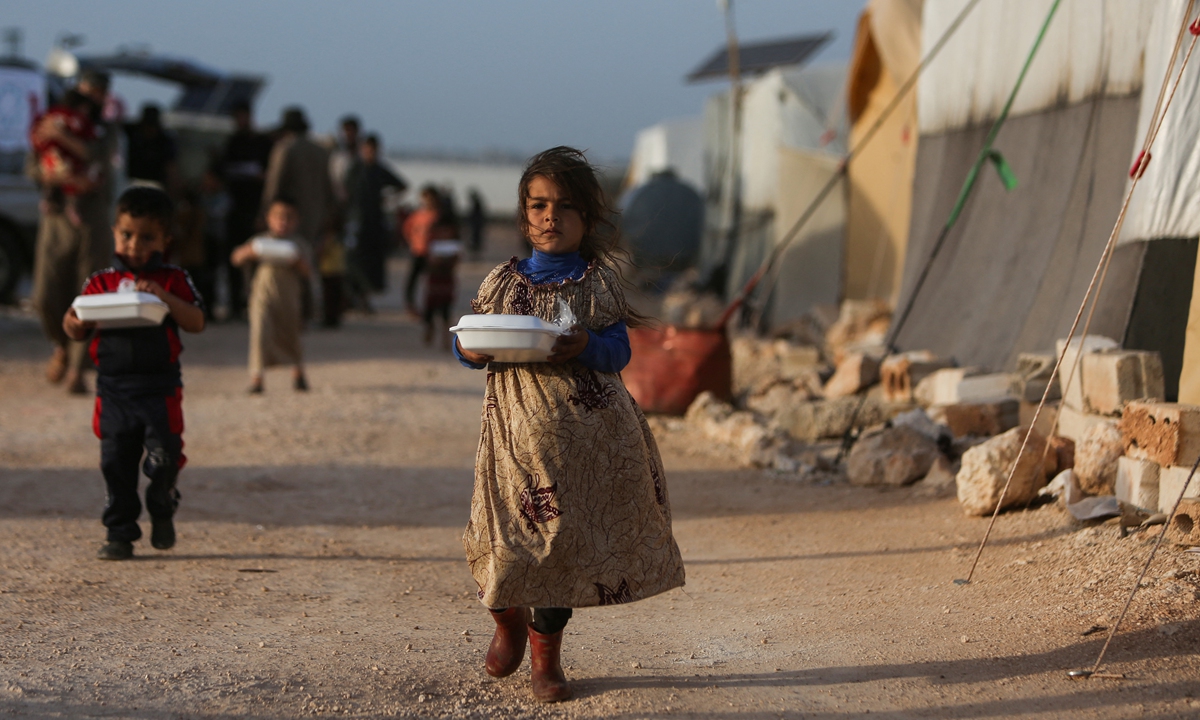
Displaced Syrian children return to their tents with boxes of food distributed by a local charity organization, at a camp for displaced people on the outskirts of Dana in Idlib province, on April 3, 2022. Photo: AFP
US atrocities overseas
The millions of Ukrainian refugees are just the latest victims of the US' global hegemony. The US waged wars across the world after WWII, which not only caused the deaths of innocent civilians but also led to a large number of refugees, seriously affecting the economic development and social stability of affected countries and regions.
The so-called anti-terrorism wars launched by the US in the past 20 years have claimed the lives of more than 929,000 people, showed a study published by the Watson Institute for International and Public Affairs at Brown University.
An investigative report by The New York Times in December 2021 revealed that American forces conducted more than 50,000 airstrikes in Iraq, Syria, and Afghanistan, causing "thousands of civilian deaths."
Observers pointed out that the US military had been concealing the number of casualties in the wars, and the actual numbers of civilian deaths were much higher than it had claimed.
The US military often covers up or underplays its war crimes. In August 2021, 10 Afghan civilians, including seven children, were killed in a drone strike conducted by US troops, before the troops withdrew from Kabul. The Pentagon later admitted the strike was a tragic mistake, but it noted that none of the military personnel involved will face any kind of punishment, reported the NYT.
At home, the US creates "information cocoons" with its feigned power of speech to keep the American public unaware of human rights abuses and humanitarian disasters caused by its troops in overseas wars. In the Vietnam War, for instance, the US military's inhumane use of a chemical weapon, the herbicide "Agent Orange," caused congenital lifelong diseases among local populations. But the US government merely dubbed such diseases "the Vietnam syndrome."
At the same time, the US has an appalling record of "producing refugees." Through the 20-year war in Afghanistan, for example, the UN refugee agency warned that some 6 million Afghans have been forcibly displaced from their homes. And nearly 23 million people, accounting for 55 percent of the country's population, are facing extreme hunger, including 3.2 million children under the age of 5.
According to the United Nations High Commissioner for Refugees' 2022 report, the Syrian war has resulted in Syrian refugees exceeding 610,000, making it the population with the highest need for resettlement.
The Global Times found that there are still 5.6 million Syrian refugees living in neighboring countries.
However, the NYT recently reported that fewer than 23,000 Syrian refugees have been admitted to the US since 2016.
Analysts pointed out that the US exports wars overseas, leading to economic decline and unrest in the invaded countries, further affecting the development of these countries and infringing on the rights of their people.
According to a December 2021 article on the UAE's Gulf Today website titled "How the US ruined Iraq devastatingly," Iraq now has four times more people suffering from diarrheal diseases than before the war due to the damage caused by the US bombing of local power plants and water treatment facilities. The lack of medicine and medical equipment has left the Iraqi healthcare system in crisis. In addition, inadequate food supplies and inflation have left Iraqis facing chronic hunger.
After the US invasion, Syria's once-thriving tourism industry was decimated, threatening the future of a generation with increased poverty, lack of jobs, and reduced educational opportunities for children, observers noted.
The US is also accustomed to using sanctions to willfully violate the right of nations to development and healthcare. Nicholas Mulder, assistant professor of history at Cornell University, previously commented on US Foreign Policy website that, long ago, many Americans considered economic war against civilians an imperialist policy for the old world, but now that Washington is wielding the sanction stick with increasing frequency, sanctions have become an endless instrument of economic warfare.
Nailed in historical pillar of shame
The US' overseas human rights records are notorious, and domestic human rights violations are not uncommon. Though the US is the richest country in the world, at least 40 million Americans live in poverty. The US is one of the most unequal society in the developed world, ranking 35th out of 37 OECD countries for poverty and inequality. The US has the highest infant mortality rate in the developed world, and the youth poverty rate is the highest in the OECD countries.
The American Civil Liberties Union pointed out that not only does the US not honor the United Nations Convention against Torture, but also selectively interprets it, leading to widespread torture and mistreatment of prisoners in Guantanamo Bay, Iraq and Afghanistan.
Moreover, US human rights issues have deep historical roots, as the US has long had problems such as racial segregation and racial inequality.
In US history, there was the genocide and massacre of Native Americans and US law enforcement brutality has resulted in frequent cases of African American deaths.
To this day, the systematic racism is still evident in every corner of American society.
For a long time, international public opinion has widely criticized the global humanitarian crisis created by the US. At the 46th session of the United Nations Human Rights Council in 2021, the Syrian representative condemned the US for evading its obligations under international law and for making excuses for its military aggression and threats to the unity and territorial integrity of other countries.
The US not only violates the human rights of other countries but also uses human rights issues to interfere in the internal affairs of other countries. The US' double standards on human rights actually use human rights as a tool to safeguard its hegemony, analysts said. "Rather than pointing fingers at other countries, the US should better reflect on its human rights violations."
